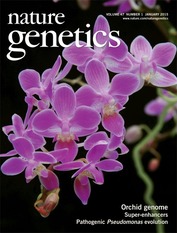The genome sequence of the orchid Phalaenopsis equestris Orchidaceae is one of the most diverse plant families and renowned for its spectacular flowers and other reproductive and ecological adaptations. Here, we present the first whole genome sequence of a tropical epiphytic orchid, Phalaenopsis equestris, a frequently used parent species for orchid breeding. Over 1.0 Gb of sequence could be assembled, which corresponds to approximately 93% of the estimated total genome size, and 29,431 protein-coding genes were predicted. Furthermore, we also identified contigs that are probably under-assembled due to heterozygosity and found those to be enriched for genes that might be involved in self-incompatibility pathways. We found evidence for an orchid specific paleopolyploidy event approximately 74 million years ago that preceeds the radiation of most orchid clades. Due to the insertion of transposable elements, intron expansion in the Phalaenopsis genome is extreme, and amongst the highest reported for plants. P. equestris is the first Crassulacean Acid Metabolism plant for which the genome has been sequenced and gene duplication seems to have contributed to the evolution of CAM photosynthesis in P. equestris. Finally, we found expanded and diversified MADS-box C/D-class, B-class AP3, and AGL6 class genes, which might be correlated with the highly specialized morphology of orchid flowers.
Orchidaceae is one of the most diverse plant families and renowned for its spectacular flowers and other reproductive and ecological adaptations. Here, we present the first whole genome sequence of a tropical epiphytic orchid, Phalaenopsis equestris, a frequently used parent species for orchid breeding. Over 1.0 Gb of sequence could be assembled, which corresponds to approximately 93% of the estimated total genome size, and 29,431 protein-coding genes were predicted. Furthermore, we also identified contigs that are probably under-assembled due to heterozygosity and found those to be enriched for genes that might be involved in self-incompatibility pathways. We found evidence for an orchid specific paleopolyploidy event approximately 74 million years ago that preceeds the radiation of most orchid clades. Due to the insertion of transposable elements, intron expansion in the Phalaenopsis genome is extreme, and amongst the highest reported for plants. P. equestris is the first Crassulacean Acid Metabolism plant for which the genome has been sequenced and gene duplication seems to have contributed to the evolution of CAM photosynthesis in P. equestris. Finally, we found expanded and diversified MADS-box C/D-class, B-class AP3, and AGL6 class genes, which might be correlated with the highly specialized morphology of orchid flowers.Cai, H., Liu, X., Vanneste, K., Proost, S., Tsai, C., Liu, K.-W., Chen, L.-J., He, Y., Xu, SX., Bian, C., Zheng, Z., Sun, F., Liu, W., , ., Pan, Z.-Y., Hsu, C.-C., Yang, Y.-P., Hsu, Y.-C., Chuang, Y.-C., Dievart, A., Dufayard, J.-F., Xu, SX., Wang, X., Wang, X., Xiao, X.-J., Zhao, X.-M., Du, Y., Zhang, G.-Q., Wang, X., Su, Y.-Y., Xie, G.-C., Liu, G.-H., Li, L.-Q., Huang, L.-Q., Luo, Y., Chen, H.-H., Van de Peer, Y., Liu, Z.-J. (2014) The genome sequence of the orchid Phalaenopsis equestris. Nat. Genet. 47(1):65–72. |
|
|
Contact:
VIB / UGent Bioinformatics & Evolutionary Genomics Technologiepark 927 B-9052 Gent BELGIUM +32 (0) 9 33 13807 (phone) +32 (0) 9 33 13809 (fax) |
You are visiting an outdated page of the BEG/Van de Peer Lab site.
Not all pages have been ported, so these archived pages are still available.
Redirect to the new website?